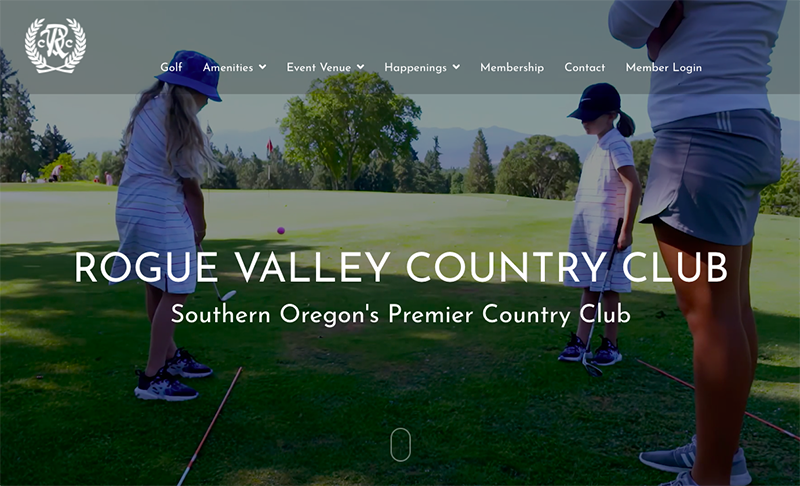The Top 5 Myths About Private Club Websites: What's Really Holding Back Your Membership Growth
In the competitive world of private clubs, your website serves as your digital front door, often forming the first impression prospective members...
5 min read
 Lisa Schmidtke
:
December 21, 2022
Lisa Schmidtke
:
December 21, 2022
My husband and I often joke that we grew up in country clubs. The joke is that we both grew up working in country clubs. So, I know what it’s like to use private club technology to promote events, look up member information and ring up sales. Now that I’m fortunate enough to be a member of a private golf club here in Minnesota, I have a new appreciation for how members use the technology. Taking it a step further, in my role as Director of Web Development for StoryTeller, who specializes in inbound marketing strategies for private clubs, I now understand that the “one size fits all” approach to selecting technologies for members, staff, and prospects is the biggest mistake clubs are making. Attracting, engaging, and selling to potential members through digital strategies requires an integrated approach and sophisticated tools that simply aren’t available through the same platform where members sign up for pickleball.
If you’re in charge of membership or communications, you might have a sense that something is wrong with your website but are struggling to pinpoint the specific issues and/or communicating to your General Manager how to fix them. Well, print this out (if you or your GM are of a certain age) or DM this link (if you’re my kids’ age) and prepare to have a conversation about how your website can be working harder and smarter.
Issue: Your website is not attracting your ideal prospect
Fix: Modernize your website
We hear from many of our private club clients that they are trying to attract a younger demographic. We then create personas to match the general age, interests and motivation for joining a country club. So why go through all this work just to direct them to an outdated website?
As a premier HubSpot partner using the new “theme” approach to designing websites on their CMS (content management system), we have access to a platform that will elevate and optimize your website immediately. Some of our clients choose to simply migrate their website to HubSpot just to boost the look and feel and to make it easier to make changes.
The private club industry, particularly those that offer golf, offers a key opportunity for dynamic visuals. While we love our manufacturing and financial clients, there’s nothing like posting a large-scale view of the 9th hole with the clubhouse in the background, front and center on a website. Or even better, a video! With such a great opportunity to highlight your facilities, don’t use stock photos.
Graphics should also include photos of people, families, and young members engaging in fun activities. This will give your ideal prospects a “30 second glimpse” of your club AND allow them to “see themselves” as members.
A key item we tackle with new website design clients is the navigation. We build a wireframe document that details each-and-every page that will be built, where it will be linked, and what it will be called. You’d be shocked at how many golf and country clubs do not have “Golf” in their navigation!
Next is events. When I see Events in the navigation, I expect to learn more about a social activity or golf tournament hosted at a particular club but what I often see is event space that can be reserved for a wedding or banquet. For many private clubs offering event space to the public, this is big business! While it’s customary to have Events as a main navigation tab, creating pages and sub navigation to private events, public events, weddings and event space rental is better for useability and SEO.
Another “prospect” you might not have considered is employees. Over the last couple of years in particular, the service industry has struggled to attract and maintain staff. While this might require me to put my own clubs on my cart (first world problems) for the private club, it means lost revenue. So how do you attract your ideal, likely younger employee? The same way you attract younger members. With a modern, mobile responsive website that quickly offers them the full scope of what you offer so that they can “see themselves” working at your country club.
Issue: Your website is a stagnant “brochure” type website with no way to engage with your audience.
Fix: Create content and usability that speaks to your prospects at all levels of the buying stage.
The younger generation wants to do online research on their own before they reach out and they’re most often using a mobile device. For this reason and for proper SEO, your website should dynamically respond to every type and size of technology they’re using to view your website. Requiring an immediate login is one way to alienate your prospects at any age. This is an example of a golf and country club whose website focus is on their members. More importantly, it offers no way for prospects to learn and engage with them.
During the course of this research, your prospects might be at different buying stages. If you only offer a contact form and phone number to “bottom of the funnel” leads, you’re missing out on engaging with the user during the entire course of their buying process.
Consider offering many CTAs (an image or text that prompts your visitor a “call to action” that moves them deeper into discovery) that can be used for lead generation. One such idea is a downloadable guide about your club (with pricing) that they need to provide their contact information through a form to receive. You can then periodically send additional content and follow-ups. Take it a step further and automate this process through HubSpot and you’ve got an additional salesperson!
Issue: Your online presence and marketing capabilities are limited in design and functionality.
Fix: Choose a website platform and technologies that offer full-scale marketing capabilities for your “public-facing” website, separate from your “member-facing” side.
Typically, when we take on a new client, we engage in a full discovery audit. This allows us to better understand their marketing and sales operations, technologies, strengths, opportunities, and identify the specific marketing activities that will best meet their business goals. For those with real challenges, it doesn’t take long to discover that they’re using the wrong platforms and technologies. And most often, HubSpot is the answer.
If you only take away one useful nugget from this blog post it is this: While it may seem efficient to build the "front-facing" or “public-facing” website on the same platform as the "back-end" or "member-facing" side, there will be headaches and limitations down the road (or even right away) in making this choice.
Club software companies do a great job of allowing members to reserve a tee time, make a dining reservation, or sign up for an event; they often miss the mark for a “marketing first” approach to attracting new members. Elements of your website that could be limited by platforms built for a “back-end” audience include:
And here’s another news flash. The front-facing and member-facing sides don’t need to be integrated. We literally add a “member login” link, usually near the navigation, that directs members to a login form housed on the back-end side. Your main website can then be used to attract, engage and sell to your ideal prospects and, once they become a member, you simply set them up as a user in your club technology portal. Easy-peasy!
If your website is not attracting your ideal prospect, is stagnant with no way to engage with potential members, and is limited in design and functionality, you need to modernize your website, create content and usability for prospects at all levels of the buying stage and choose the right technologies.
Keep in mind, if your website doesn’t offer users a snapshot of who you are and how you’re unique in the first 30 seconds, they’ll move on. Contact me for a quick conversation about how we can prevent that from happening.

In the competitive world of private clubs, your website serves as your digital front door, often forming the first impression prospective members...

Rogue Valley Country Club (RVCC) raises the bar as a private club that is looking into the future and is on a mission to expand its membership. They...

"We don't really need a good website—we get most of our members from word of mouth."